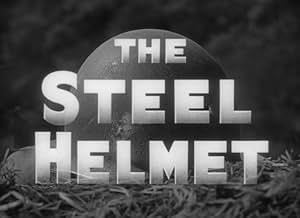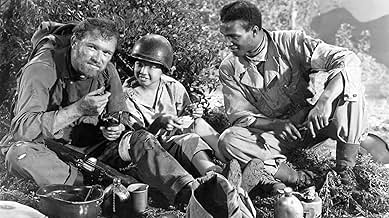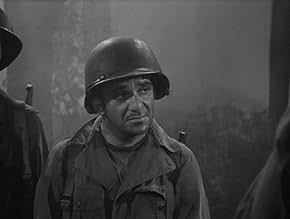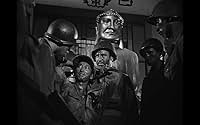Une bande indisciplinée de laissés-pour-compte américains se bat contre des troupes communistes supérieures en nombre dans un temple bouddhiste abandonné pendant la Guerre de Corée.Une bande indisciplinée de laissés-pour-compte américains se bat contre des troupes communistes supérieures en nombre dans un temple bouddhiste abandonné pendant la Guerre de Corée.Une bande indisciplinée de laissés-pour-compte américains se bat contre des troupes communistes supérieures en nombre dans un temple bouddhiste abandonné pendant la Guerre de Corée.
- Récompenses
- 1 victoire au total
Avis à la une
THE STEEL HELMET is the film that established Fuller as a director . It was the first film produced on the Korean war . One thing that is problematic about the Koran war is trying to make a film that is unique to that conflict and one that couldn't have easily have taken place in the second world war . The British film A HILL IN Korea ( A film that gave Michael Caine his screen debut ) suffered from this but THE STEEL HELMET doesn't . Despite the later debacle of Vietnam one thing military historians universally agree upon is that the worst military performance of the 20th Century of the American military was the early stages of the Korean War that saw the longest military retreat of American forces which happened on the Korean peninsula in the Summer of 1950 . This film tells of that retreat
One criticism about war films of any era is that they're jingoistic flag wavers where Uncle Sam kills lots of enemy soldiers with hardly a single American suffering a scratch . Not so in THE STEEL HELMET where the film starts of in a down beat way with a lone American survivor waking up surrounded by the bodies of his dead comrades and finding that things might just be about to get worse and the story develops in the same gloomy manner and makes the cogent point that in this conflict not all the combatants wear a uniform . It also makes a point about the absurdity of war with little touches that while it's okay to drop bombs and kill people Holy shrines are untouchable . It also shows American servicemen in a rather unheroic light and considering this was produced when America was fighting a war with a very uncertain outcome this alone elevated THE STEEL HELMET to mini-masterpiece status
Now, tough-talking, homely-looking army sergeants were pretty much a staple of the era, (think James Whitmore in Battleground {1949}). However, they usually took orders from a handsome leading man like Van Johnson, and so were clearly secondary, even if important, characters. Not so here. Sgt. Zack (Evans) leads the cast, takes orders only reluctantly, and deploys the patrol in combat situations like an officer. At best, he only tolerates his nominal superior, Lt. Driscoll (Brodie). I take it that Fuller is being as honest as possible about the often hostile relations between officers and enlisted men, especially intense (as I understand it) during WWII, which was Fuller's formative war experience. Driscoll may have the authority to give orders, but he has to earn Zack's respect -- an inspired use of the steel helmet symbolism.
Another major theme is Fuller's concern for racial equality, a touchy societal topic also ahead of its time. The concern for mutual help and understanding is obvious in the relationships Zack forms with the Korean boy (Chun) and the black corporal (Edwards). Zack doesn't pander to the black soldier, but he does treat him as just that, a medic and a soldier, no more and no less. Fuller also puts the needed equality in a larger, national context when the North Korean major (Fong) tries to drive a racial wedge between the diverse members of the patrol. In fact, communist propaganda was often successful in Third World countries when pointing out the widespread racial discrimination within American democracy. Thus, Fuller's implicit message was a bold and timely one for Cold War audiences.
It's also important, I think, to point out that Sgt. Zack is not particularly likable. He's ornery and unfriendly. Initially he tries to get rid of the kid, probably because he knows relationships in war can be risky. He doesn't want to get close to anyone. In fact, it's because he gets too close to the Korean kid that he makes a big military mistake by shooting the Red major. I like the way Fuller uses that blunder to bring Zack down a few notches. In effect, Driscoll expresses the officer's point of view by saying that because of his blunder, Zack is too dumb to be an officer. Whether true or not, the dressing down prevents Zack's character from being over-idealized, an important concession from a director clearly on the side of enlisted men like Zack.
Nonetheless, despite the quality of the story, Lippert productions remains a cut-rate affair. The outdoor action never gets beyond the tell-tale scrublands of greater LA, while the studio fog machine works overtime disguising the rickety exterior set. Still and all, the temple scenes are well mounted, and I don't know where they got that massive centerpiece Buddha, but it's impressive as all-get-out. The frozen smile remains a puzzle throughout the action, a fitting cosmic commentary, I guess, on the passing concerns of mortal men.
Speaking of Lippert, I felt a twinge of dread when I saw Sid Melton's name in the cast credits. He was responsible for much of that company's customary low-brow comic relief and I anticipated the worst. My guess is that Fuller okay'ed him for the film, but on condition he not be allowed to speak and risk his usual audience associations. After all, Pvt. Baldy (Monahan) is supposed to provide what chuckles there are. It's also surprising to see WWII's favorite sadistic Japanese officer, Richard Loo, in a sympathetic role for a change. Fortunately, it's one that also shows what a fine actor he was.
For all the movie's many merits, it still remains rooted in the cultural climate of WWII. Made at the outset of the Korean conflict, it betrays none of the ambiguities that would later surround America's involvement in that far-off land. The enemy is treated as straightforwardly wicked, and in a revealing piece of combat footage, mowed down in human waves. As a belated tribute to the dog-faces of WWII, Fuller pays his debt of respect and gratitude. However, this is a combat movie, and what politics there are reflect more about social conditions in the US than in Korea. Actual insight into the character of the Korean war only emerges later in such films as The Bridges of Toko-Ri (1954) and the much overlooked I Want You (1951). Nonetheless, Fuller proves himself here to be a doggedly independent filmmaker. More importantly, it also shows he's a filmmaker with something significant to say. And it's that important point on which his cult reputation rests.
Le saviez-vous
- AnecdotesFilmed in ten days only six months after the outbreak of hostilities, this film became the first Korean War movie.
- GaffesShort Round sings the South Korean National Anthem to the tune of "Auld Lang Syne" while Pvt. Bronte plays on his organ. However, the music to South Korea's national anthem was changed from Auld Lang Syne to the Finale of Korea Fantasiaat at a ceremony celebrating the founding of South Korea on August 15th, 1948, exactly three years after liberation from Japanese rule, and three years before The Steel Helmet was made.
- Citations
The Red: I just don't understand you. You can't eat with them unless there's a war. Even then, it's difficult. Isn't that so?
Cpl. Thompson: That's right.
The Red: You pay for a ticket, but you even have to sit in the back of a public bus. Isn't that so?
Cpl. Thompson: That's right. A hundred years ago, I couldn't even ride a bus. At least now I can sit in the back. Maybe in fifty years, sit in the middle. Someday even up front. There's some things you just can't rush.
- Crédits fousInstead of the traditional "The End", the closing title reads, "There is no end to this story".
- ConnexionsFeatured in The Typewriter, the Rifle & the Movie Camera (1996)
- Bandes originalesAuld Lang Syne
Traditional
Meilleurs choix
- How long is The Steel Helmet?Alimenté par Alexa
Détails
Box-office
- Budget
- 103 000 $US (estimé)
- Durée
- 1h 25min(85 min)
- Couleur
- Rapport de forme
- 1.37 : 1

































